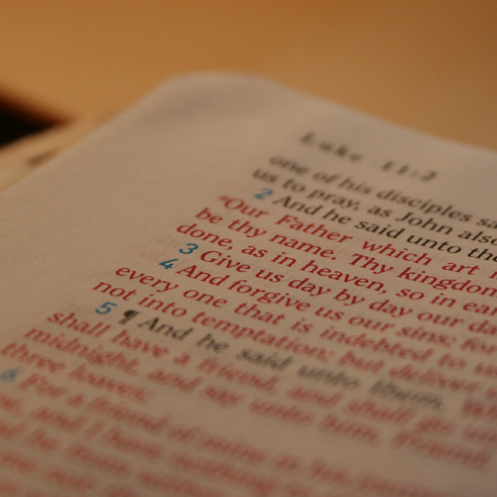Praying in the Plural
We have a guest writer today…Jan Flickinger. I’ve known Jan just a short time but was inspired when she shared a short writing. I must admit, this gave me a different outlook on the Lord’s Prayer. I hope you enjoy it and see the lesson that Jan’s heart was given.
Praying in the Plural
“Have you noticed,” a friend asked, “that the pronouns in the Lord’s Prayer are plural?”
No, I hadn’t. And I failed to see what difference it made.
The Lord’s Prayer can easily go through my lips without passing through my mind.
Its familiarity enables me to read it without really seeing it and to listen to it without hearing it.
I know it so well that it appears invisible.
Plural? Hmm.
Sure, I use the Lord’s Prayer as a guide. So “Father” begins my conversation with God, that is my Father.
Do I believe I am the center of the universe? Am I thinking I am an only child?
What about the brother of the prodigal? Did he wish he were an only child? It seems so. I imagine him in the morning saying, “ Father, I’m going out in the fields again today to slave for you, as usual.” As for the absent one— oh well, out of sight, out of mind. Could he have said “Our Father” without it touching his own heart, without thinking of his brother?
The plural opens the door to warm inclusiveness. It triggers care and concern. It keeps the relational alive.
My singular attitude keeps me imprisoned in my comfort zone—my self, my family, my Christian clique, my church, my denomination. But when I come to our Father who created, loves, and calls to himself the wanderers, and those at home; those who are obviously going down the wrong path and those who think they are doing everything right; those who don’t yet believe and those who do, I find my heart changing. Sisterly love begins to grow for the in-group and the out-group. I want “me” and “them” to become “us,” so that together we can say, “Our Father.”
It is hard to realize it’s not just all about me. But changing “give me this day…” to “give us this day…” helps. “Give me” expresses a simpler request— self-contained, no responsibility. I sit alone, content in my gratitude for answered prayer. But “give us” brings thoughts of the lonely at my church, the homeless in my community, the needy around the world, and my responsibility to them. “Give us” makes me listen for the date of the next food drive. It opens my heart to the African community’s need of a good water supply. It expands my world and my sense of responsibility to it.
We then get to see God answer prayer through His provision and the miracle of sharing.
But I could do so much more. I’m short sighted and selfish. Sinful is a strong word, so I’ll avoid calling it that. I’ll just say “forgive me.” My situation is unique, after all. I have an excuse, a reason really. Tiredness prevented me from doing what I should. I may have sounded rude and self-seeking, but you misunderstood. I would have helped, but I had no choice.
But “forgive us” touches my deepest need and reminds me I am a fellow human being with a sin problem. It’s a matter of identity. We’re in this together. This leaves me no room to pity or scorn others because their sin, of course, is worse than mine. “Forgive us” creates room for compassion for others and gratitude to God. Jesus was tempted and never sinned. I, on the other hand, am left with neither excuses nor reasons and with nothing to say except “forgive us.”
Praying in the plural – what difference does it make?
It enlarges our hearts, it cracks the boundaries of our comfort zones, and it destroys our smug excuses.
Praying in the plural expands and changes our world one singular person at a time, and it follows the example of our Lord.
Thank you Lord for this reminder from Jan of our need to pray in the plural. We were made as a family and therefore should pray as one. Keep us connected so our eyes are off of ourselves, and placed on the needs of those around us.
